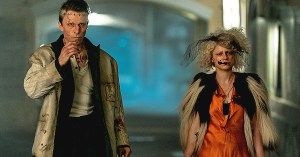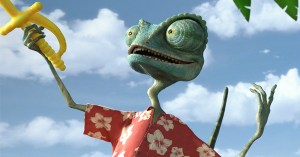RT-UK Exclusive: Stephen Woolley talks "How to Lose Friends…"
Stephen Woolley is one of the UK’s most successful producers, with a string of credits to his name that include titles like "Interview with the Vampire", "The Crying Game", "Michael Collins" and "Little Voice." As a director he most recently delivered "Stoned", the Brian Jones biopic. RT-UK caught up with him recently at the Cannes Film Festival where he gave us the latest on the soon-to-shoot "How to Lose Friends and Alienate People" based on the book by journalist Toby Young.
"The book is Toby Young going to New York in the nineties, getting this plum job at Vanity Fair and then just screwing up," Woolley told RT-UK, "it’s very funny and very self-deprecating. He doesn’t blame anyone except for himself, he realises that he just didn’t know how to behave in New York."
The cast includes Simon Pegg, Kirsten Dunst and Jeff Bridges, and we spoke to Woolley about his choices. "[Toby’s character Sidney] is obnoxious and if you’re going to cast an obnoxious character you want to find someone you quite like," Woolley said, "So when they do something bad you sympathise with him; you want to like him. Simon’s so likable that you really want to like him.
"Kirsten Dunst then came on board and she’s going to be really great for Alison, who’s kind-of the less glamorous person around in this world of glamorous celebrity."
Woolley also mentioned that the film would include a number of celebrity cameos. "It’s about how the tail wags the dog. The whole idea behind the book and in turns behind the film is that Sidney’s character thinks that they should rule, that the stars should be pandering to them, not the other way around," he told us, " It’s not about Julia Roberts wanting to be interviewed by Rotten Tomatoes, it’s about you needing Julia Roberts, you know. That’s the whole thing that Sidney doesn’t quite get.
"We’ve got loads of celebrity cameos in the film. None that I can tell you now because they’re all interchangeable and we’re out to lots of different people at the moment, but as we go on we’ll be able to release names and let you know."
The film goes into production this month, and RT-UK will be sure to keep you updated on the shoot. For now, though, you can read our full interview with Woolley below:
RT-UK: How to Lose Friends and Alienate People; for someone who’s unfamiliar with the book could you maybe explain what it’s all about?
SW: Basically the book is Toby Young going to New York in the nineties, getting this plum job at Vanity Fair and then just screwing up. He didn’t deliberately screw up, he just did, and the more he tried to conform the more he basically lost friends. He was at the top and he just slid down the pole.
It’s a great read; it’s very funny and very self-deprecating. He doesn’t blame anyone except for himself, he realises that he just didn’t know how to behave in New York. He was arrogant and deluded and he thought, "I’m from London. They’re all going to know who I am, they’re all going to respect me, I’ll just go out there and be the cock of the walk." They just took one look at him and said, "Who are you? This isn’t going to work."
It’s a very funny read and we got it about four years ago and we hired a writer, Peter Straughan, to write the screenplay. We realised that the book was really a series of anecdotes – there was no through-line – and for a movie you really need something to hold onto.
I read a script of Peter’s called Three Bad Men, which was really funny, about three serial killers who get together and decide that they’re going to stop killing. And then, of course, they come across people they really want to kill! It’s an hilarious script but it never got made. I loved it and I thought it was just the right kind of humour for the film. Peter wrote a terrific script which introduces a little more of a romantic-comedy line but in a slightly less formulised rom-com way.
I sent that out to a bunch of directors and Bob Weide, who does Curb Your Enthusiasm, really loved the script. I met with him and bought him on board. And Simon Pegg came on board because I thought he was absolutely the right person to play Toby’s character. Simon’s got brilliant comic timing.
RT-UK: He’s also got that self-deprecating thing down pat…
SW: Yeah, the guy is obnoxious and if you’re going to cast an obnoxious character you want to find someone you quite like. So when they do something bad you sympathise with him; you want to like him. Simon’s so likable that you really want to like him. That was really crucial casting for us, casting Simon, and the rest fell into place after that.
Kirsten Dunst I worked with on Interview with the Vampire and Bob Weide did a film called Mother Night with her, which he wrote and produced. When Kirsten’s name came up we realised we both knew her. She came on board and she’s going to be really great for Alison, who’s kind-of the less glamorous person around in this world of glamorous celebrity.
RT-UK: Really? She’s always struck me as rather glamorous.
SW: I think in Spider-Man she’s always played a kind-of much more ordinary character and I think she’s great at that. She’s not a supermodel; Kirsten’s quite attainable. She’s not the girl equivalent of those six-foot-five guys you see walking down the Croisette that you look at and think, "I’ll never be that. I’m never going to have a suntan like that, I’m never going to walk like that, I’m a nerd." She’s like us, which is great, and I think that’s part of her appeal.
RT-UK: She gets a bit drowned, I think, by the scale of Spider-Man. She doesn’t get the time she deserves.
SW: Nobody really does, do they? They’re just all crash-bang-wallop special effects. Spider-Man 2 was great, I thought Sam really pulled that off.
RT-UK: They’re great movies, but actors are often part of the scenery in them. I loved her in Elizabethtown, where she really gets to explore the character she’s playing.
SW: I actually really loved her in Bring it On, my kids made me watch it and I thought she was really great in that. I love Kirsten and I think you’re right, she doesn’t get enough time in the Spider-Man series. But what she does do and what she symbolises is not an extraordinary person, just someone that you can relate to, and I think that was very important for our script. You get someone like Keira Knightley, who’s great and a brilliant actor, but she’s otherworldly. She’s not in our world.
RT-UK: How does Jeff Bridges fit into the cast?
SW: Jeff was always our first choice to play this part. Clayton Harding is the character, based on Graydon Carter. He was always our first choice but wasn’t available when we were originally ready to go. We went to a whole host of actors from Robin Williams through to Michael Douglas, you know, all these actors. Robin Williams loved the script but we couldn’t make the dates work, and it all went round and round in circles. Finally we said, "What about Jeff? Is he still busy?" He was doing Iron Man when we originally wanted to go and he’d finished so we went back to him, he read it and loved it and said he’d do it.
The reason Jeff was our first choice was because he has gravitas, he has the ability to play humour, and plus he has that twinkle in his eye. You know that, at some point, he would have been the rebel and now he’s the conformed guy who’s Mr. Straight. At one point you know he’d have been as rebellious as Sidney, Simon’s character. It’s important that you understand why he employs him because it’s weird to employ this Brit guy to come to Vanity Fair, or Sharps as it’s called in our film, and work there. You have to have a sense of mischievousness there to understand why he does that. Jeff is ideal for that.
RT-UK: All the pieces fell into place in time.
SW: Yeah, it was great. Danny Huston’s playing another guy in the office and Gillian Anderson is playing a PR woman.
It’s about how the tail wags the dog. The whole idea behind the book and in turns behind the film is that Sidney’s character thinks that they should rule, that the stars should be pandering to them, not the other way around. It’s not about Julia Roberts wanting to be interviewed by Rotten Tomatoes, it’s about you needing Julia Roberts, you know. That’s the whole thing that Sidney doesn’t quite get. He thinks it’s the Algonquin Club where you’ve got Dorothy Parker and Benchley and Groucho Marx, writers as Gods and actors as cattle.
Whereas of course PR is now so strong that you can’t get to touch the hem of Keira Knightley’s dress without having to go through a string of PR companies and be there at 3:10 on the dot and if you say the wrong thing you’re out, you know. It’s control and it’s about that kind of celebrity. There’s a real truth in the film and it’s not necessarily a truth that the general public will understand, and it’s not what we’re hammering home because in a sense it’s a romantic comedy, but the underlying satire is very strong and it’s very real.
I think the closest films for us are the films of Billy Wilder. Films like The Apartment, where you’ve got these characters who are caught up in something they don’t quite understand. They’re railing against something which they realise is really nonsense.
RT-UK: Is it set during the same period of the book in the nineties?
SW: No, we’ve updated it completely. Nothing has changed!
RT-UK: You’ve changed the names of the characters and the magazine, are you using real stars as reference points?
SW: Yeah, we’ve got loads of celebrity cameos in the film. None that I can tell you now because they’re all interchangeable and we’re out to lots of different people at the moment, but as we go on we’ll be able to release names and let you know.




